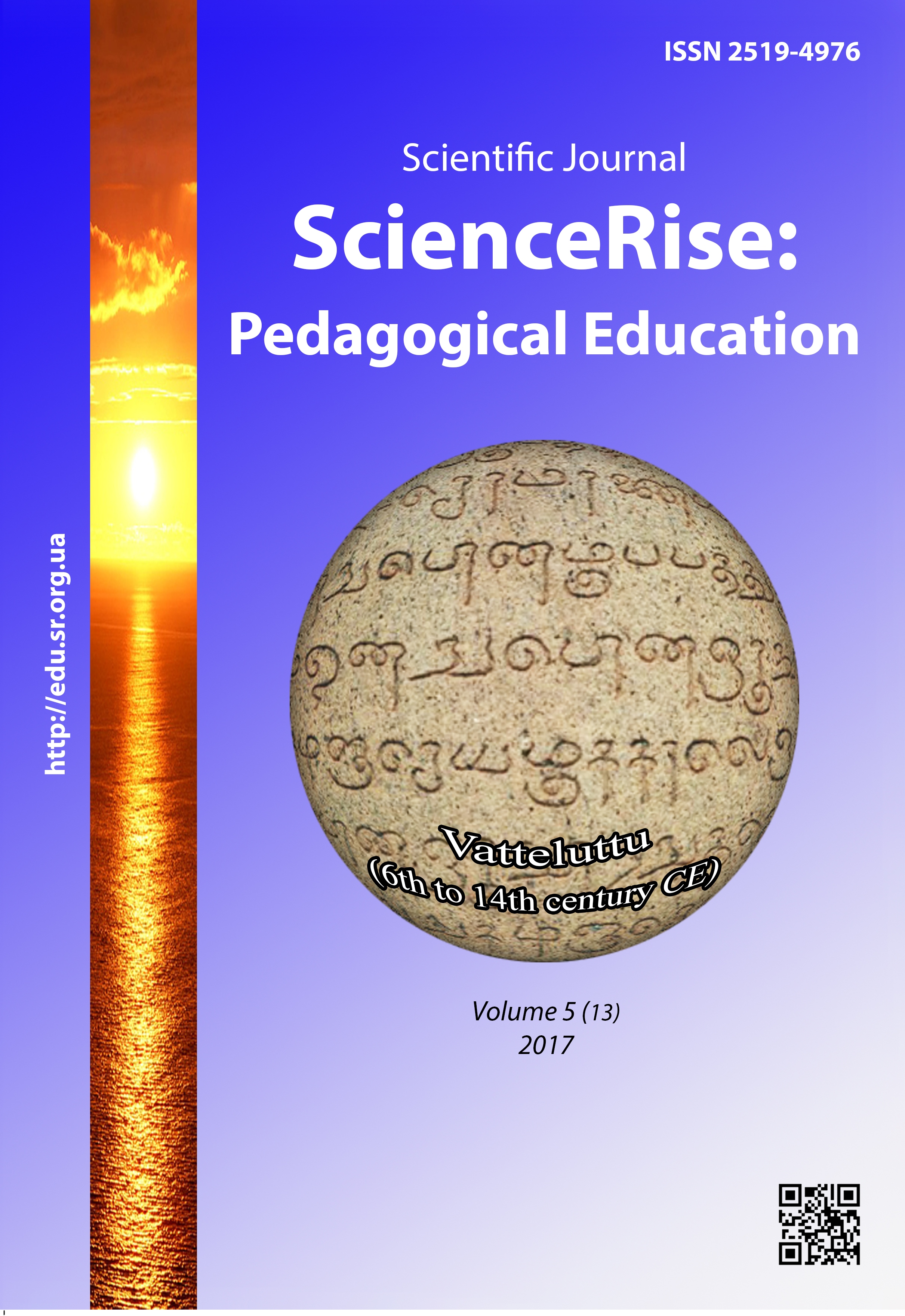Analysis of conceptual categorical apparatus of research of higher mathematics tests quality
DOI:
https://doi.org/10.15587/2519-4984.2017.102729Keywords:
test, test quality, computer oriented assessment, reliability, validity, task complicationAbstract
In the article is presented the conceptual categorical apparatus, used at the study of the quality of tests in higher mathematics. The main notions, necessary for constructing the method of test quality assessment, are selected and defined, namely:
Test it is a system of tasks of specific form, certain content for objective assessment of the level of students’ readiness with the preliminary set methodology of results analysis;
Test quality it is a test characteristic that indicates the correspondence to requirements, presented to test characteristics in whole and to separate test tasks (the mean parameters of test quality is validity, effectiveness of test tasks – complication and differentiation ability);
Assessment of test quality it is a procedure of the determination of a correspondence degree of characteristics of separate test tasks and test in whole to quality criteria and the formation of a conclusion about test quality;
Computer oriented assessment of test quality it is an assessment of test quality using ICT;
Methodology of computer oriented assessment of test quality it is a theoretically grounded and logically regulated totality of methods of test quality assessment using ICT.
The introduced notions distinctly outline research directions; determine assessment methods and ways of quality improvement of tests in higher mathematics that, in its turn, favors the improvement of students’ knowledge control
References
- Alekseeva, I. V., Gaydey, V. O., Dykhovychnyi, O. O., Konovalova, N. R., Fedorova, L. B. (2009). Pro rozvytok ta dosvid ekspluatatsii komplektu dystantsiinoi osvity «Vyshcha matematyka» [On the development and operation experience of set of distance education “Higher Mathematics”]. Didaktika matematiki: problemi i doslidzhennya, 31, 49–56.
- Bykov, V. Yu., Bohachkov, Yu. M., Zhuk, Yu. O.; Bykov, V. Iu., Zhuk, Yu. O. (Eds.) (2008). Monitorynh rivnia navchalnykh dosiahnen z vykorystanniam Internet-tekhnolohii. Kyiv: Pedahohichna dumka, 128.
- Bespal'ko, V. P. (1988). O kriteriyah kachestva podgotovki specialistov. Vestnik vysshey shkoly, 1, 3–9.
- Chelyshkova, M. B. (2002). Teoriya i praktika konstruirovaniya pedagogicheskih testov [Theory and practice of constructing of pedagogical tests]. Moscow: Logos, 431.
- Kuznecov, A. A. (1998). Ocenka dostizheniya trebovaniy obrazovatel'nyh standartov. Moscow: Nac. centr standartov i monitoringa obrazovaniya, 26.
- Balyhina, T. M. (2000). Slovar terminov i ponyatiy testologii. Moscow: Izd-vo RUDN, 164.
- Kukhar, L. O., Serhiienko, V. P. (2010). Konstruiuvannia testiv [Test design]. Lutsk, 182.
- Avanesov, V. S. (2004). Osnovy pedagogicheskoy teorii izmereniy. Pedagogicheskie izmereniya, 1, 3–19.
- Anastazi, A., Urbina, S. (2007). Psihologicheskoe testirovanie. Saint Petersburg: Piter, 688.
- Linden, W., Hambleton, R. (1997). Handbook of Modern Item Response Theory. New York: Springer, 510. doi: 10.1007/978-1-4757-2691-6
- Kim, V. S. (2007). Testirovanie uchebnyh dostrizheniy [Testing of educational achievements]. Ussuriysk: Izdatel'stvo UGPI, 214.
- Croker, L., Algina, Y.; Zvonnikov, V. I., Chelyshkova, M. B. (Eds.) (2010). Vvedenie v klassicheskuyu i sovremennuyu teoriyu testov [Introduction to Classical and Modern Test Theory]. Мoscow: Logos, 668.
- Lisova, T. V. (2012). Modeli ta metody suchasnoi teorii testiv [Models and methods of the modern test theory]. Nizhyn: Vidavets PP Lisenko M. M., 112.
- Mayorov, A. N. (2001). Teoriya i praktika sozdaniya testov dlya sistemy obrazovaniya [Theory and practice of test construction for the educational system]. Moscow: Intellekt-centr, 296.
- Hronlund, K., Norman, E. (2005). Otsiniuvannia studentskoi uspishnosti Kyiv: Navchalno-metodychnyi tsentr "Konsortsium iz udoskonalennia menedzhment-osvity v Ukraini", 312.
- Drahan, Ye. V. (2012). Kompiuterno oriientovana tekhnolohiia otsiniuvannia navchalnykh dosiahnen studentiv fizychnykh spetsialnostei na osnovi ymovirnisnykh teorii testuvannia. Kyiv, 218.
- Honcharenko, S. U. (1997). Ukrainskyi pedahohichnyi slovnyk. Kyiv: Lybid, 376.
- Dykhovychnyi, O. O., Dudko, A. F. (2016). Otsiniuvannia zmistovnoi validnosti testiv z vyshchoi matematyky z vykorystanniam Google Docs dodatku. Informatsiini tekhnolohii i zasoby navchannia, 52 (2), 52–61. Available at: http://journal.iitta.gov.ua/index.php/itlt/article/view/1383/1032
- Dykhovychnyi, O. O., Dudko, A. F. (2014). Zastosuvannia informatsiinoi funktsii dlia analizu ta pidvyshchennia efektyvnosti testiv z vyshchoi matematyky. Informatsiini tekhnolohii i zasoby navchannia, 41 (3), 55–69. Available at: http://journal.iitta.gov.ua/index.php/itlt/article/view/1040/790#.U7xiCZR_tbE
- Dykhovychnyi, O. O., Dudko, А. F. (2015). Kompleksna metodyka analizu yakosti testiv z vyshchoi matematyky [The comprehensive procedure of analysis of tests in higher mathematics]. Naukovyi chasopys NPU imeni M. P. Drahomanova. Seriya No. 2. Kompiuterno-oriientovani systemy navchannia, 15 (22), 140–144.
- Dykhovychnyi, O. O., Dudko, A. F. (2013). Computer-based analysis system of results of online testing in higher mathematics. Naukovi pratsi DonNTU. Seriia: Pedahohika, psykholohiia i sotsiolohiia, 2 (14), 103–110.
Downloads
Published
How to Cite
Issue
Section
License
Copyright (c) 2017 Oleksandr Dykhovychnyi, Anna Dudko

This work is licensed under a Creative Commons Attribution 4.0 International License.
Our journal abides by the Creative Commons CC BY copyright rights and permissions for open access journals.
Authors, who are published in this journal, agree to the following conditions:
1. The authors reserve the right to authorship of the work and pass the first publication right of this work to the journal under the terms of a Creative Commons CC BY, which allows others to freely distribute the published research with the obligatory reference to the authors of the original work and the first publication of the work in this journal.
2. The authors have the right to conclude separate supplement agreements that relate to non-exclusive work distribution in the form in which it has been published by the journal (for example, to upload the work to the online storage of the journal or publish it as part of a monograph), provided that the reference to the first publication of the work in this journal is included.







